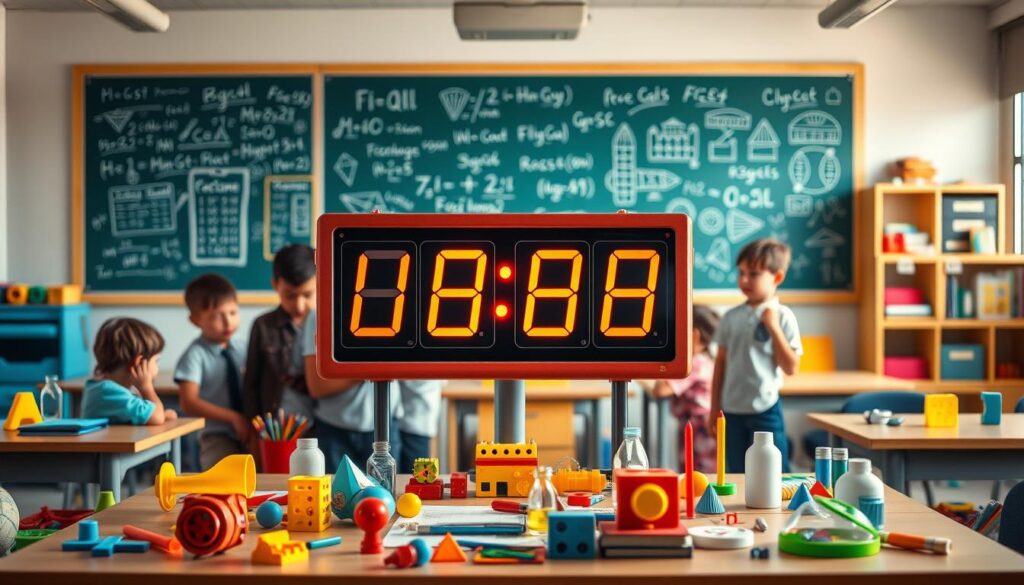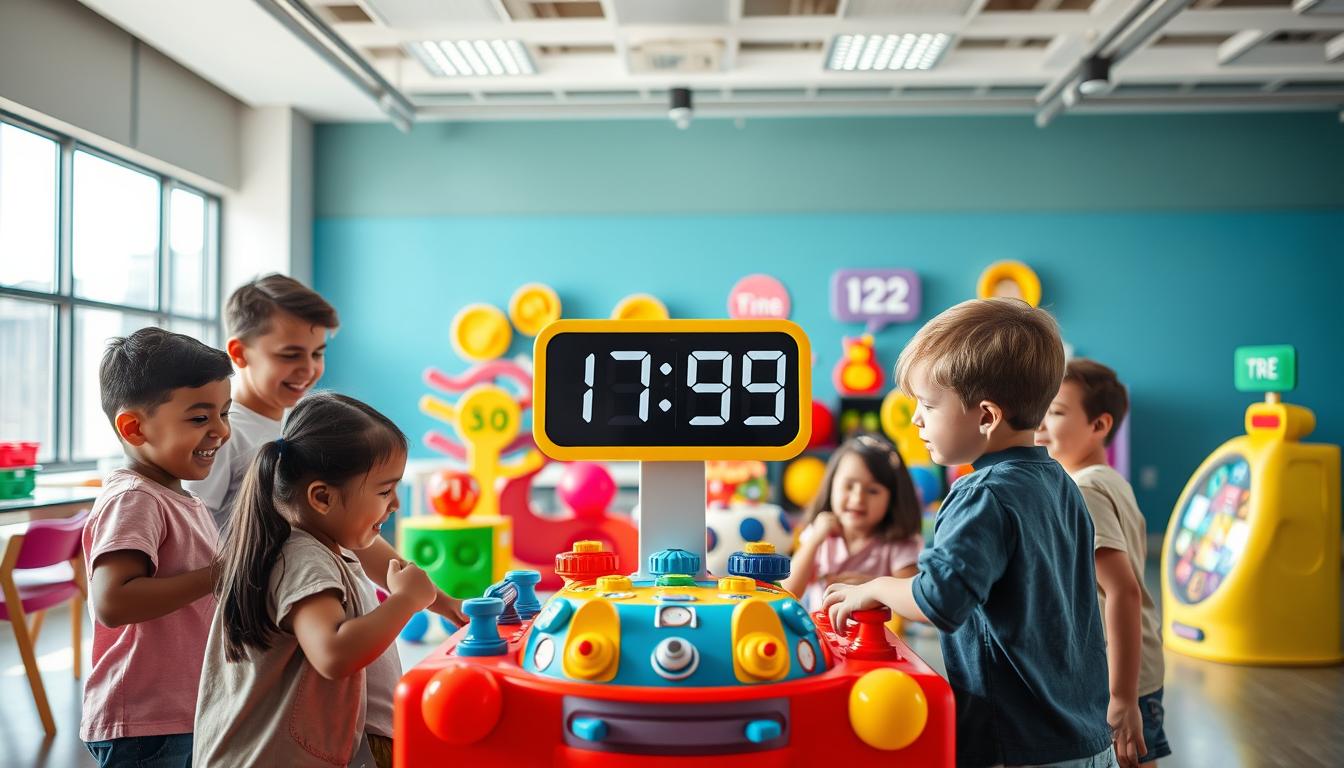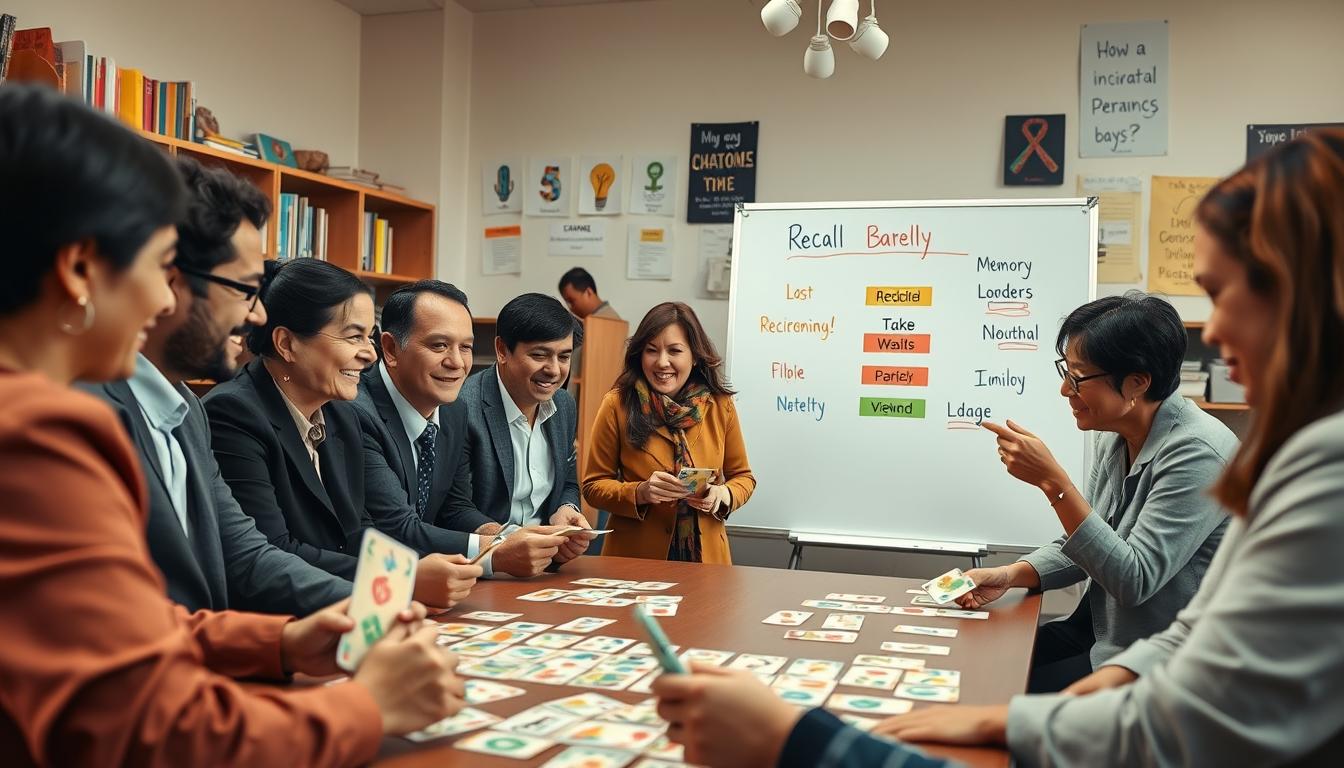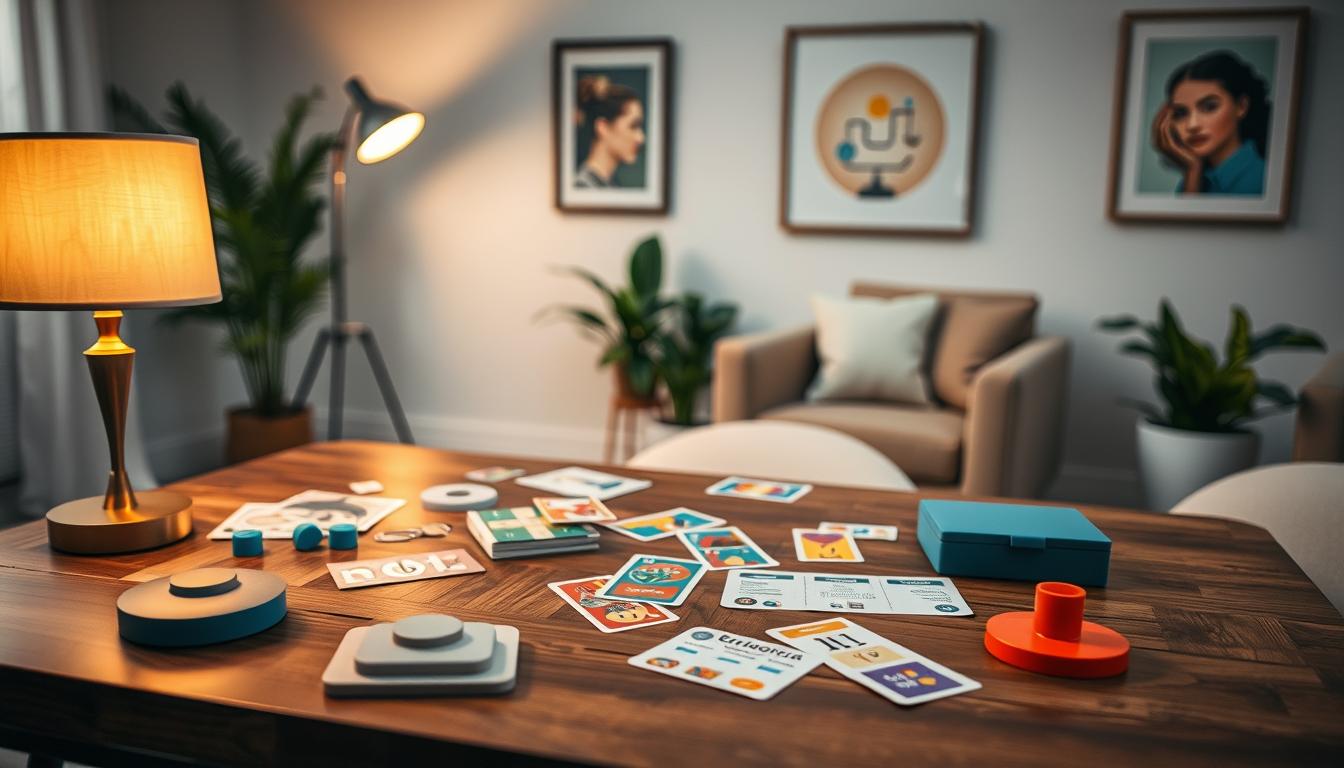Educational games with countdowns to enhance quick reasoning
Can a ticking clock turn education into an exciting journey? As old learning methods lose interest, games with countdowns offer a fresh way to boost quick thinking. These games don’t just improve brain power; they also make learning fun and interactive.
By adding countdowns, these games push players to think fast and sharp. This makes learning both fun and effective. Let’s look at different educational games and how they help improve quick thinking.
The Importance of Quick Reasoning in Education
Quick reasoning is key in education. It helps students deal with challenges fast. This skill lets them solve problems quickly and make smart choices, especially in math.
Studies show that quick reasoning boosts critical thinking. Students with these skills can handle tough problems better. Teaching quick reasoning helps students get ready for the real world.
Adding activities that improve quick reasoning to school plans is a great idea. Puzzles, games, and timed tests keep students interested and teach them to solve problems. This way, students become better at thinking and doing well in many areas of life.

What Are Educational Games with Countdowns?
Educational games with countdowns are fun ways to learn. They make players work fast to finish tasks before time runs out. This creates a sense of urgency and boosts motivation.
These games come in many forms, like digital quizzes or board games. They are designed for different learning settings. This makes them accessible to everyone.
Game-based learning makes education fun. Countdowns add a challenge that improves quick thinking and decision-making. Players use their knowledge in exciting ways, making learning dynamic.
Interactive learning turns boring tasks into exciting challenges. It grabs students’ attention and makes learning fun. With the right tools, educators can make learning outcomes better.

Benefits of Brain Games with Time and Pressure Constraints
Brain games with time limits and pressure have many benefits. They improve cognitive development by boosting quick thinking and memory. Players must think fast and make smart plans when time is short.
Studies show kids who play these games get better at math. They solve problems faster and feel more confident in school. Playing these games often helps kids grow intellectually.
| Benefits | Description |
|---|---|
| Quick Decision-Making | Players enhance their ability to make rapid choices, an essential skill in both academic and real-world situations. |
| Improved Memory Retention | Time constraints encourage active recall, helping to solidify information in memory. |
| Enhanced Problem-Solving Skills | Learning to tackle challenges under pressure prepares students for complex situations in their studies. |
| Increased Confidence | Successful navigation through time-limited tasks builds a sense of accomplishment and self-efficacy. |
How Countdown Games Improve Cognitive Skills
Countdown games are great for boosting quick thinking, memory, and focus. They challenge players to make fast choices when time is short. This keeps the brain sharp, especially the part that handles complex thinking and self-control.
Playing countdown games regularly can make you better at many tasks. The fast pace helps you think fast and right, which is perfect for training your brain. You’ll get better at math and understanding complex ideas as you play more.
As you tackle different challenges, your mental quickness grows. You’ll get better at handling pressure, which boosts your confidence in your brain power. Countdown games make learning fun and are a great way to improve your brain’s function.
Types of Games That Enhance Quick Reasoning
Many educational games help improve quick reasoning in students. They make learning fun and boost important thinking skills.
Math puzzles are great for quick thinking. They challenge players to solve problems fast. This helps learners think critically and plan their answers.
Timed quizzes also boost quick thinking. They help students remember information fast. This improves both their reasoning and memory.
Games like math bingo and Jeopardy-style quizzes make learning fun. They encourage teamwork and quick thinking. Logic puzzles also improve reasoning by requiring fast analysis and decision-making.
Cosmic Countdown: A Fast-Paced Challenge for All Ages
Cosmic Countdown is a fun game that mixes quick learning with interactive fun. Players race to find missing numbers in countdowns before a spaceship blasts off. This game is exciting for all ages and helps improve quick thinking and problem-solving skills.
Engaging Game Mechanics and Features
The game’s design keeps players hooked. It adjusts to each player’s skill level, making the game personal. The countdown adds a thrilling rush, boosting brain power. As players move up, they face tougher number puzzles, growing their math skills.
Learning Through Fun with Cosmic Countdown
Cosmic Countdown combines fun with learning perfectly. Players enjoy the game while learning about numbers. This game is a great way to learn, making learning fun and engaging.
Rocket Math: Boosting Arithmetic Skills Under Pressure
Rocket Math is a top choice for boosting kids’ math skills through fun timed challenges. It’s a game that makes learning math exciting. Kids do quick exercises on basic math like addition, subtraction, and more. They get to compete, making learning fast and fun.
Timed Challenges for Mastering Basic Operations
Rocket Math’s timed challenges help kids learn and get better at math. They feel the rush of beating the clock, which pushes them to do their best. Here are some cool things about Rocket Math:
- The game adjusts to fit each player’s level, so everyone gets a fair challenge.
- Players get instant feedback, helping them fix mistakes and learn from them.
- Tracking progress shows how far they’ve come, keeping them motivated to keep improving.
Playing Rocket Math really helps kids get better at basic math. It turns math practice into something fun and rewarding.
The Role of Online Platforms in Learning
Online learning platforms are changing how we learn. Sites like ABCmouse, Prodigy, and Cool Math Games offer fun, interactive games. These games make learning fun and effective for kids.
Digital learning lets students learn at their own speed. This makes learning more personal and independent. These platforms offer a wide range of educational materials for all skill levels and interests.
Interactive educational games make learning more appealing. They motivate students and help them think critically. This approach creates a lively learning space that sparks curiosity and encourages growth.
| Online Learning Platform | Key Features | Focus Areas |
|---|---|---|
| ABCmouse | Comprehensive curriculum, progress tracking, rewards system | Reading, math, science, art |
| Prodigy | Adaptive learning, math challenges, interactive quests | Mathematics, problem-solving |
| Cool Math Games | Variety of logic and skill games, user-friendly interface | Math, critical thinking |
Interactive Math Games for Classroom Engagement
Interactive math games are key teaching tools that boost classroom engagement. They turn regular lessons into exciting activities that grab students’ attention. By using these games, teachers make learning fun and interactive, encouraging students to get involved.
These games give students instant feedback, helping them see how they’re doing. They make learning math concepts easier and more fun for everyone. Plus, they help students work together, share ideas, and solve problems as a team.
Interactive math games help teachers teach important concepts in a fun way. They create a lively classroom where everyone can participate. This method not only helps students learn better but also builds a sense of community, making school more enjoyable for everyone.
Encouraging Critical Thinking Through Game Mechanics
Educational games use new game mechanics to help students think critically. They dive into different scenarios, making them think deeply and see things from many angles. This makes them better at solving problems, as they face complex challenges and make smart choices.
Game mechanics help students break down big problems into smaller parts. This method boosts analytical thinking and lets players think creatively. By playing, they learn to mix information and use math in real life, improving their understanding and memory.
Also, educational games offer chances for teamwork in solving problems. Players learn to share their ideas well, leading to deeper talks and insights. This team effort strengthens critical thinking and lets students try new ideas safely.
In short, using game mechanics in learning is a great way to boost critical thinking. Students get to use these interactive tools, which help them solve problems better. This skill helps them in school and in life.
Math Puzzles and Logic Games: Sharpening Analytical Skills
Math puzzles and logic games are great for kids to improve their analytical skills. They help young minds spot patterns, plan strategies, and solve tough problems. By tackling different puzzles, kids get hands-on experience that makes math concepts stick.
Math puzzles can be simple or very complex. Each puzzle offers a new challenge, helping kids learn to solve problems. Logic games also boost critical thinking. Players learn to think ahead, considering the outcomes of their actions.
Here are some examples of popular math puzzles and logic games:
- Sudoku: A classic number-placement game that enhances logical reasoning.
- Kakuro: A crossword-style game that applies addition and subtraction skills.
- Logic grid puzzles: These encourage systematic thinking and deductive reasoning.
Playing math puzzles and logic games can spark a love for learning. As kids get better at these games, they become more confident in facing challenges. This confidence helps them in school and beyond.
Advantages of Using Game-Based Learning Approaches
Game-based learning brings big benefits to education, changing how we learn. It makes learning fun and engaging, getting students to take part in their studies. Games encourage teamwork and competition, making the classroom more lively and improving relationships between teachers and students.
Studies show that students who use games to learn remember things better. Games make hard subjects easy and fun to understand. This way, students feel more confident and ready to face tough topics, improving their learning journey.
Teachers see a big boost in students’ self-confidence when they use games in class. This positive change helps students view learning in a better light, leading to lasting success. By mixing fun games with learning goals, students achieve better results in school.
Cognitive Development through Playful Learning
Playful learning is key for kids’ brain growth. Educational games make learning fun and build important skills. They help improve memory, creativity, and problem-solving, setting a strong base for school success.
Studies show that playful learning sparks brain connections in kids. These connections boost cognitive skills that help them in many areas of life. By playing educational games, kids learn to think critically and make smart choices, preparing them for life’s hurdles.
Creating a Fun and Supportive Environment at Home
Creating a fun and supportive learning space at home is key for kids’ education. Home learning boosts skills and strengthens family bonds. Parents can make learning fun by playing educational games with their kids.
This makes learning interactive and enjoyable. It helps kids understand concepts better and encourages them to explore their interests.
Having access to good educational games and tools is important for kids’ learning. In a supportive home, study time can be fun and productive. By adding educational activities to daily life, parents keep their kids motivated and curious.
Improving Memory and Concentration with Countdown Games
Countdown games are a fun way to improve memory and concentration. Players must remember information fast, all while the clock ticks down. This pressure helps them focus better and boosts their brain power.
These games make learning more exciting. Kids get better at remembering things and solving problems quickly. This helps them do well in school and remember things better.
| Game Type | Focus Area | Memory Improvement Benefits | Concentration Benefits |
|---|---|---|---|
| Math Challenge | Numerical Recall | Enhances quick recall of numbers | Requires sustained attention to solve |
| Word Scramble | Vocabulary Recall | Improves retention of new words | Increases focus while decoding |
| Trivia Quiz | General Knowledge | Strengthens memory of facts | Encourages concentration through rapid answers |
Exploring Popular Educational Game Examples
Popular educational games have changed the way we learn, making it more fun and effective. Games like Prodigy Math and Rocket Math show how games can improve learning. Prodigy Math mixes math challenges with adventures, helping students solve problems and improve their skills.
Rocket Math, on the other hand, focuses on basic math. It teaches students important math concepts quickly. This game helps students learn and remember math under time pressure.
Interactive puzzles are also key in educational games. They help students think critically and solve problems. For example, Jigsaw Explorer helps players improve their spatial skills by solving puzzles.
Kahoot! is another great example. It turns quizzes into fun competitions. This game helps students remember what they learn by working together.
These games show how diverse and effective educational gaming can be. They make learning fun, helping students grow and learn important skills.
Conclusion
Games with countdowns are key in boosting quick thinking and problem-solving skills. They make learning fun and help students understand complex ideas better, even when they’re under pressure.
These games are not just fun; they also help students love learning. They build important thinking skills needed for success in school. By using these games, teachers and parents can make learning exciting and engaging.
Using educational games is a great way to improve learning. It shows a bright future for how we learn. By focusing on interactive play, we can make education more effective and enjoyable for everyone.
FAQ
What are the benefits of educational games with countdowns?
Educational games with countdowns boost quick thinking and improve brain skills. They make learning fun by adding a time limit. This helps kids focus and learn faster.
How do countdown games help in improving math skills?
Countdown games help with math by teaching kids to solve problems fast. This builds their math skills and confidence in school.
What types of cognitive skills can be developed through these games?
These games improve skills like memory, focus, and quick thinking. They also enhance critical thinking and problem-solving.
Are there specific educational games that focus on quick reasoning?
Yes, games like Cosmic Countdown and Rocket Math focus on quick thinking. They use time challenges to improve these skills.
How can parents support their children in using educational games?
Parents can help by playing games with their kids. They should also provide access to good games. This helps kids learn and grow together.
Why is engaging with educational games important for children?
Playing educational games helps kids develop important skills. It boosts their motivation and makes them enjoy learning. This is key for success in school.
Can interactive math games be implemented in classrooms effectively?
Yes, interactive math games can make learning fun in class. They offer feedback and help kids learn together. This makes complex ideas easier to understand.
How do educational games contribute to playful learning?
Educational games make learning fun by improving brain skills and memory. They also boost creativity and problem-solving. This is great for kids’ development.
What role do online platforms play in educational gaming?
Online platforms like Prodigy and ABCmouse change learning. They offer games that make learning personal and fun. This makes education accessible and engaging for kids.














